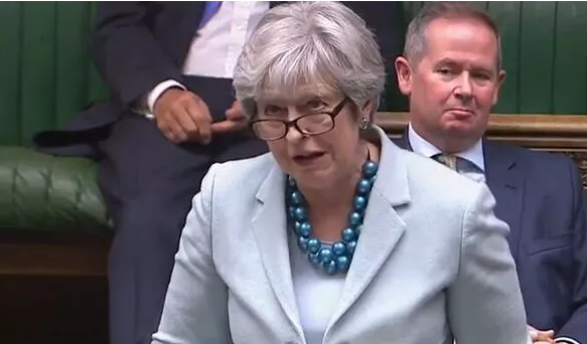Getting Brexit done
News & Social Media / Post
Britain still hasn't taken back control

“I do not welcome this bill,” says former prime minister Theresa May on the Northern Ireland Protocol Bill. She says the bill is not “legal under international law”. This is a common view among the Very Serious People ™. International law is sacrosanct and no government must act in contravention of it. To exercise national sovereignty it is to be a rogue state. We also get the customary bleating about the Good Friday Agreement.
On this, the EU has two options. Either it agrees to reopen the protocol or it learns to live with whatever the Tories unilaterally implement. Since Sefcovic is adamant they won’t do the former, that as they say, is that.
That the Tories are making a giant mess is a separate issue. The EU has previously made a number of concessions in order for the Protocol to work better, but the Tories have seemingly decided that national sovereignty takes precedence, and all thigs considered, I don’t really really disagree with them. NI is part of the UK and if there is to be a regulatory border then the proper place for it is between Ireland and Northern Ireland.
If the Tories stick to that line then the conversation becomes one of how to facilitate the maximum frictionless trade, which, as I’ve postulated before, could then be used to address friction on the Dover-Calais route. This is something the EU is most concerned about in that it would restore a degree of single market functionality without the UK being a fully signed up member. The EU is hiding behind the GFA, but really this is about maintaining the integrity of their regulatory borders. I don’t blame them but they should at least be honest about it.
Something else we all need to be honest about is that the GFA in its current form is dead. It was at death’s door before Brexit and Brexit gave it that last little shove, and Ireland has used the situation to advance its own agenda. Again, I can’t say I blame them for trying, but they can’t be surprised it resulted in Tory unilateralism.
In any case it’s hard to see a future for the GFA being that it locks in the ECHR. Along with reaffirming a commitment to human rights in the Good Friday Agreement, parties agreed to change legislation in the UK to incorporate the European Convention on Human Rights (ECHR) of the Northern Ireland Act (1998). The Northern Ireland Act of 1998 also provided for the establishment of the Northern Ireland Human Rights Commission which observed ECHR precedent. After the approval of the agreement in the referendum, The Northern Ireland Act (1998) guaranteed the establishment of the ECHR in Northern Ireland.
The Tories have not yet committed to quitting the ECHR but the writing is on the wall. Dominic Raab’s Bill of Rights Bill, as I understand it, partially disapplies the ECHR. Exactly how this would operate in practice is unclear, but unless there is a specific provision for the continued operation of the GFA, it’s as good as dead. I suspect the Bill of Rights will end up being an incoherent mess much like Patel’s borders bill, and wide open to legal challenges that brings us back to square one.
In my view, the ECHR has to go in its entirety and it can’t be fudged. That, though, is a battle the Tories arent; keen on. They’re hoping it can be fudged. They don’t want to confront the Left, and the huge human rights industry, but it’s also a matter of laziness. Without the act/convention, they will have to think in terms of replacement legislation and codes – which is no small undertaking, and will eventually point in the direction of a written constitution. That is a can of worms, I suspect, they don’t want to open. Sorting it is too much like hard work, and also could diminish executive powers. They like the fudge the way it is and the Tories have squandered the last of their political capital. This should have been the first order of business after Brexit.
We will no doubt hear more squealing about breaking international law, but the concept is ultimately meaningless. It implies a sort of simplistic, back and white lawbreaking, with the boys in blue ready to pounce with handcuffs at the ready. It doesn’t work like that any more than the WTO has black helicopters ready to swoop in if we put tariffs on steel.
International law is a vast canvass, and most of the treaties have more the aspect of contract law (in some languages, “treaty” and “contract” are the same word). Thus, in effect, we will be in breach of contract – a civil matter to be resolved in the first instance between the parties without the involvement of any outside agencies. And often the main way to resolve a dispute is to rewrite or modify the contract, whence life goes on. Invoking the term “illegal” is just drama queen stuff, overheated rhetoric by people who don’t really understand what they are dealing with. In this instance, the EU and the UK can do a ritual dance and then sit down and sort something out. That’s what they do.
Ultimately the job of reordering the British constitution is too big and too complex, and too contentious for a lame duck PM like Boris Johnson. The most we can expect from this administration is a series of fudges that point in the right direction, but it’s going to take a committed and serious government to hammer it all the way home. If it’s not going to happen under Johnson then it’s unlikely his immediate successor will either. Unpicking Blair’s human rights regime is a long term project and we shall likely suffer a Labour government in the interim.
In any case, removing the legal impediments to implementing a functioning borders policy is only half of the job. We still need a coherent enforcement regime and for the Home Office to stop dragging its heels. That will require a change of culture within the department and internal resistance suggests the Home Office should be broken up and a new department for deportations established, staffed by carefully vetted people who actually want to do the job.
Ultimately Brexit demanded a revolution in terms of the British constitutional make up. Remainers squeal that the ECHR is separate to the EU, but it was part of the Europeanisation of our constitution, and is still an intolerable impediment to national sovereignty. Brexit alone wasn’t going to undo the constitutional damage of the last half century.
This should be viewed as an opportunity to renew British democracy. As much much as we need to remove the bloated and creaking ECHR regime, we need to modernise our constitution in recognition of the fact that the two party Wesminster carousel is no longer an adequate basis for our front line politics. At its core, this is what Brexit was supposed to be about, and Brexit won’t be “done” until there’s a government willing to recognise it.
Recent National News











